Portraits
of
American Philosophy
Portraits
of
American Philosophy
Edited by Steven M. Cahn
ROWMAN & LITTLEFIELD
Lanham Boulder New York Toronto Plymouth, UK
Published by Rowman & Littlefield
4501 Forbes Boulevard, Suite 200, Lanham, Maryland 20706
www.rowman.com
10 Thornbury Road, Plymouth PL6 7PP, United Kingdom
Copyright 2013 by Rowman & Littlefield
All rights reserved. No part of this book may be reproduced in any form or by any electronic or mechanical means, including information storage and retrieval systems, without written permission from the publisher, except by a reviewer who may quote passages in a review.
British Library Cataloguing in Publication Information Available
Library of Congress Cataloging-in-Publication Data
Portraits of American philosophy / edited by Steven M. Cahn.
pages cm
Includes bibliographical references and index.
ISBN 978-1-4422-2333-2 (cloth : alk. paper) -- ISBN 978-1-4422-2334-9 (electronic)
1. Philosophy, American--20th century--Biography. I. Cahn, Steven M.
B935.P665 2013
191--dc23
2013012114
 TM The paper used in this publication meets the minimum requirements of American National Standard for Information Sciences Permanence of Paper for Printed Library Materials, ANSI/NISO Z39.48-1992.
TM The paper used in this publication meets the minimum requirements of American National Standard for Information Sciences Permanence of Paper for Printed Library Materials, ANSI/NISO Z39.48-1992.
Printed in the United States of America
In memory of
Sidney Hook (19021989)
and
Ernest Nagel (19011985),
past presidents of the Eastern Division of
the American Philosophical Association,
past officers of The John Dewey Foundation,
each others dearest friend,
and my inspiration.
Acknowledgments
I am most grateful to the distinguished philosophers who delivered John Dewey Lectures and reviewed them for this volume.
I also wish to express my appreciation to Jon Sisk, my long-time editor, for his advice and encouragement; to his assistant, Benjamin Verdi, for his support; to Marissa Parks for her initial advocacy; to senior production editor Alden Perkins for her thoughtful assistance, and to other members of the staff at Rowman & Littlefield for valuable help.
Please note that these lectures are published with the permission of the John Dewey Foundation. The appendix to the lecture by Ruth Barcan Marcus is used with the permission of Judith Jarvis Thomson. All John Dewey Lectures may be found in the Proceedings and Addresses of the American Philosophical Association.
Introduction
Steven M. Cahn
Beginning in December 1964, and each subsequent year for decades after, I attended the Eastern Division Meetings of the American Philosophical Association. During that period, I also occasionally traveled in the spring to the Central or Pacific Division Meetings. While participants at these gatherings focused on listening to lectures, interviewing candidates for faculty positions, and networking with colleagues and publishers, little opportunity was presented to reflect on the personal side of academic life: kindnesses offered, disappointments suffered, discord endured, dreams fulfilled.
Amid the whirl of convention activity, the only moment when such emotion regularly came to the fore occurred in the business meeting, where the presiding officer read the names of those philosophers who had died during the preceding year. While a few were well known, most were not, but as the list was recited, a shadow seemed to pass over the room, as the small assemblage, standing for a moment of silence, reflected perhaps on an unknown time in the future when their own deaths would be reported in this very setting. After a few moments, though, the audience retook its seats, and any hint of melancholy disappeared.
I, however, always wondered about the lives of those late scholars. How had their careers unfolded? Who had spurred their interests? Who had aided their academic efforts?
At most conferences, such questions do not occupy anyones attention. Indeed, retired professors are rarely at the center of activity; many do not even make an appearance. Their names may still be known, but their faces are no longer recognized.
To help remedy this situation, several years ago, in my role as president of the John Dewey Founation, I proposed to the other members of the Board, Professors Karen Hanson of the University of Minnesota, Israel Scheffler of Harvard University, and Robert Westbrook of the University of Rochester, that each year we sponsor lectures at the three annual meetings of the American Philosophical Association, inviting distinguished senior scholars, chosen by the Divisional Executive Committees, to reflect on how their careers had been influenced by the people and issues of their times.
My colleagues strongly supported the idea, and we named the lectures in honor of John Dewey, widely regarded as the leading American philosopher of the first half of the twentieth century. Born in 1859 in Burlington, Vermont, where he attended elementary and secondary schools and was graduated from the University of Vermont, he held appointments at the University of Michigan, the University of Minnesota, the University of Chicago, and finally at Columbia University, where he taught for decades. The author of forty books and more than seven hundred articles, he made major contributions to virtually every area of philosophy. In addition to lecturing worldwide, he played a key role in political debates of his time, and was a founder of the American Association of University Professors, the American Civil Liberties Union, and the New School for Social Research. To celebrate his eightieth birthday, the American Philosophical Association named him its honorary president and requested that he retain this title for the duration of his life, the only person ever so recognized. Dewey died in 1952, his political awareness having experienced the development of the United States from the end of the Civil War to the tumultuous years of the Truman administration. Linking him, therefore, to these lectures about the development of American philosophy and philosophers seemed fitting.
All three divisions agreed to participate, and the first lecture was given in 2006. Not all the speakers have focused on how their early years and later successes were affected by the individuals and trends on the American philosophical scene, but some lecturers have offered rich and compelling accounts of these matters. In any case, today the presentation of the John Dewey Lecture has become a highlight at each national meeting of the American Philosophical Association.
Publishing constraints required a difficult choice from among the twenty addresses delivered thus far. Those I selected were all by past presidents of the American Philosophical Association or related scholarly societies and remind us that the life of a scholar is not only an adventure in ideas but also a tale of personal struggle.
In these talks (reprinted here in virtually their entirety), we find insightful accounts of major themes in American philosophy since 1950. These include the temporary dominance of logical positivism and then ordinary language philosophy; the animus between some supporters of so-called analytic philosophy and Continental philosophy; barriers built on prejudice of religion, race, gender, and sexual orientation; the impact of the Civil Rights movement, the Vietnam War, and feminism; new approaches to research in a variety of sub-fields; and deepened understanding of how the history of philosophy can be enriched through concentrated textual and contextual study. Also included are profiles of leading philosophy departments of the time, including those at Harvard, Princeton, Columbia, Yale, and Cornell, as well as a detailed account of the rise and decline of the remarkable philosophy program developed at the Rockefeller Institute (now Rockefeller University).
Next page
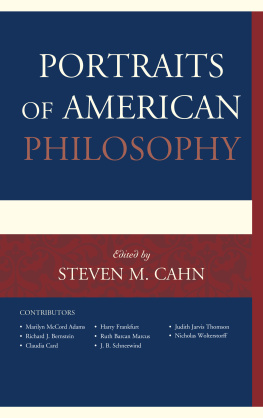
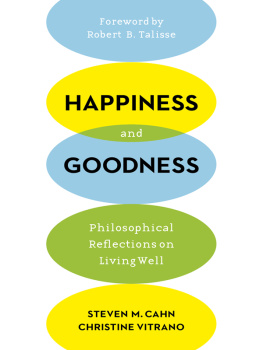







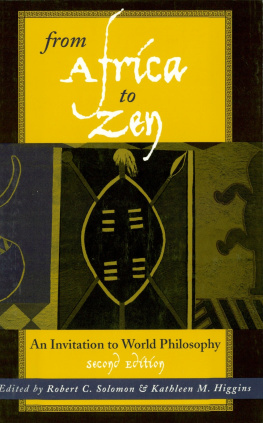
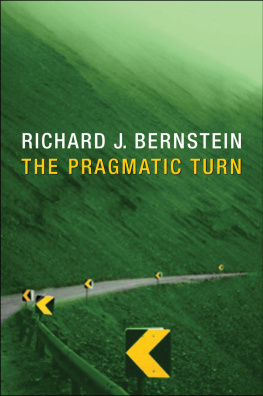
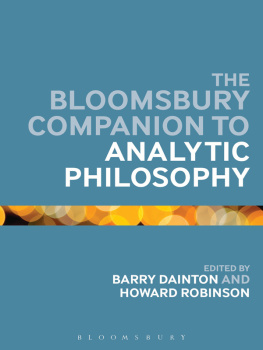

 TM The paper used in this publication meets the minimum requirements of American National Standard for Information Sciences Permanence of Paper for Printed Library Materials, ANSI/NISO Z39.48-1992.
TM The paper used in this publication meets the minimum requirements of American National Standard for Information Sciences Permanence of Paper for Printed Library Materials, ANSI/NISO Z39.48-1992.